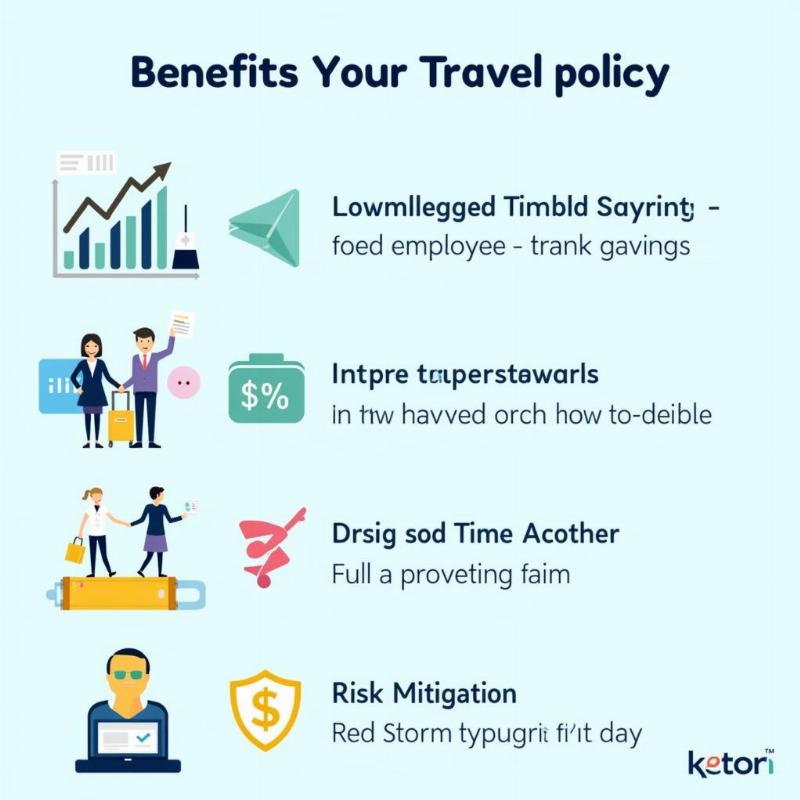A well-defined travel policy for employees is crucial for any organization, especially those with frequent business travel. It not only streamlines travel arrangements but also ensures cost-effectiveness, employee safety, and compliance with regulations. This guide provides a detailed overview of essential elements to consider when crafting or revising your company’s travel policy.
What is a Travel Policy and Why is it Important?
A travel policy is a document outlining guidelines and procedures for employee business travel. It addresses various aspects, from booking flights and accommodation to claiming expenses and ensuring employee safety. Having a clear travel policy offers numerous benefits, including cost control, risk management, and improved employee experience. It ensures consistency and transparency in travel arrangements, minimizing confusion and potential disputes.
 Benefits of a Comprehensive Employee Travel Policy
Benefits of a Comprehensive Employee Travel Policy
Key Components of a Travel Policy
A robust travel policy should cover several key areas:
Travel Booking and Reservations
- Pre-trip Authorization: Establish a clear approval process for travel requests.
- Booking Methods: Specify preferred booking channels (e.g., company travel agent, online platforms).
- Travel Class: Define permissible travel classes (e.g., economy, business) based on factors like trip duration and employee seniority.
- Accommodation: Outline guidelines for hotel selection, including preferred chains and maximum allowable rates.
Expense Management and Reimbursement
- Expense Reporting: Detail the process for submitting expense reports, including required documentation and deadlines.
- Per Diem Rates: Set daily allowances for meals and other incidental expenses.
- Payment Methods: Specify preferred methods for expense reimbursement (e.g., direct deposit, company credit card).
Travel Safety and Security
- Risk Assessment: Outline procedures for assessing travel risks and implementing necessary precautions.
- Emergency Contacts: Provide employees with a list of emergency contacts, including company representatives and local authorities.
- Travel Insurance: Specify the type of travel insurance provided and coverage details.
Travel Policy Compliance
- Policy Adherence: Emphasize the importance of adhering to the travel policy and consequences of non-compliance.
- Data Privacy: Address data privacy concerns related to travel bookings and expense reports.
Implementing and Communicating the Travel Policy
Effective implementation and communication are essential for a successful travel policy.
- Training: Conduct training sessions to educate employees about the policy’s provisions and procedures.
- Accessibility: Ensure easy access to the travel policy document through the company intranet or other readily available platforms.
- Regular Review: Regularly review and update the travel policy to reflect changes in travel regulations, industry best practices, and company needs.
Conclusion
A comprehensive and well-communicated travel policy is an essential tool for any organization managing employee business travel. It not only helps control costs and mitigate risks but also contributes to a smoother and more efficient travel experience for employees. By addressing key areas such as booking, expenses, safety, and compliance, a well-crafted travel policy empowers employees to travel confidently and efficiently while safeguarding the organization’s interests. Regularly reviewing and updating the policy will ensure it remains relevant and effective in meeting evolving business travel needs.
FAQ
- What is the purpose of a travel policy? A travel policy provides guidelines for employee business travel, ensuring cost-effectiveness, safety, and compliance.
- Who should have access to the travel policy? All employees who travel for business should have access to the travel policy.
- How often should the travel policy be reviewed? The travel policy should be reviewed at least annually or as needed based on changes in regulations or company needs.
- What are the consequences of non-compliance with the travel policy? Consequences may vary depending on the severity of the violation and could include disciplinary action.
- What should I do in case of a travel emergency? Contact the emergency contacts listed in the travel policy immediately.
- How can I request reimbursement for travel expenses? Follow the expense reporting procedures outlined in the travel policy.
- Can I book my own travel arrangements? Refer to the travel policy for specific guidelines on booking methods.
PlaTovi offers comprehensive travel solutions to help your business manage travel efficiently. From booking flights and accommodations to crafting tailored travel policies, we cater to all your travel needs. With our expertise in travel management, we ensure smooth and cost-effective travel experiences for your employees. Contact us today at [email protected] or +91 22-2517-3581 to learn more about how PlaTovi can help you optimize your corporate travel program.